A Bridge to the 19th Century
Compared to the Democrats' groundbreaking lineup of candidates, the 10 white men who gathered for last week's Republican debate showed a determination to cling to the bad old days.WASHINGTON — You have to hand it to the Republican Party. It’s made history again.
When its field of presidential candidates strode onto the stage at the Ronald Reagan Presidential Library for their first debate, the Republicans became the first contemporary political party to feature only candidates who represent a minority of America.
Who knew?
The dark business suits, the preponderance of made-for-TV red ties and the surfeit of balding pates shimmering under the lights spoke louder than the candidates themselves. The all-white, all-male lineup was a perfect picture of patriarchy for Republicans, who often take pride in calling themselves “the Daddy party” — the better to cast Democrats as that soft-and-girlie “Mommy party.”
What can you say about a party that thinks these years of locker-room machismo in the White House should be followed by four more? You can say that its presidential candidates represent a distinct and diminishing minority. According to the 2000 Census, white men made up 37 percent of the population. Heck, men aren’t even a majority among white people — women are.
For all the attention paid to the groundbreaking Democratic presidential field that includes a woman, a black and a Hispanic, isn’t the retro look of the Republican candidates as significant a statement?
The Republican Party just can’t get over it. The 20th century, that is.
It can’t seem to grasp the civil rights movement, the women’s movement, the gay rights movement, the global wave of immigration that has brought millions of Hispanics, Asians and other people of color to the United States. They’re all chasing the American dream that the Republicans embrace, at least when it is dreamed by people who look like them.
Remember macaca? The young, Indian-American volunteer for the Jim Webb campaign who was famously ridiculed by George Allen at a campaign event during the U.S. Senate race in Virginia last fall was singled out not just for his dark skin color but for his supposed newcomer status. “Welcome to America and the real world of Virginia,” taunted Allen, an incumbent who was supposed to breeze to re-election — and contend for the 2008 Republican presidential nomination.
The Webb aide, S.R. Sidarth, was in fact born and raised in northern Virginia and was an honor student at the University of Virginia. Voters didn’t see him as an unwanted interloper; they saw him as a neighbor. And they elected Democrat Webb to the Senate, in one of the pivotal races that led to the turnover of power on Capitol Hill.
Virginia is one of seven states in which increased turnout among black voters played a role in Democratic victories last fall, according to an election analysis by David Bositis of the Joint Center for Political and Economic Studies, which studies trends in black voting and political attitudes. The list reads like a road map through potential presidential-election swing states: Florida, Michigan, Missouri, Ohio, Pennsylvania and Tennessee are among them.
Coupled with the influx of Hispanics and other nonwhites, demographic changes already have put big states such as California and New York effectively out of reach for Republican presidential candidates. With Hispanics alone projected to comprise almost a quarter of the population by 2030, how does the hostility toward immigrants among many core Republican supporters — the very base voters its candidates must woo to win the nomination — lead to victory?
“We’re coming to a tipping point and it’s a tipping point that’s unfavorable to Republicans,” Bositis says.
Demographics aside, how about their debating points?
The Republicans competed for the distinction of being toughest against abortion, thus telling American women that politicians are entitled to make their most intimate decisions for them. Former Wisconsin Gov. Tommy Thompson said businesses should be allowed to fire gay employees, though he backtracked in subsequent interviews, perhaps because impressing the Republican base seemed less urgent than repairing the damage. And, of course, there was the visual highlight of the night when three candidates — Sen. Sam Brownback of Kansas, Rep. Tom Tancredo of Colorado and former Arkansas Gov. Mike Huckabee — raised their hands to assert that they do not believe in evolution. It’s just a thought, but how can a party whose would-be leaders reject the foundation of modern biology be trusted with the challenge of global warming?
Bill Clinton pledged to build a “bridge to the 21st century,” a slogan so trite as to invite ridicule. Now Republicans offer a scarier path. Theirs is a road back to the 19th.
Marie Cocco’s e-mail address is mariecocco(at symbol)washpost.com.
© 2007, Washington Post Writers Group
Your support matters…Independent journalism is under threat and overshadowed by heavily funded mainstream media.
You can help level the playing field. Become a member.
Your tax-deductible contribution keeps us digging beneath the headlines to give you thought-provoking, investigative reporting and analysis that unearths what's really happening- without compromise.
Give today to support our courageous, independent journalists.
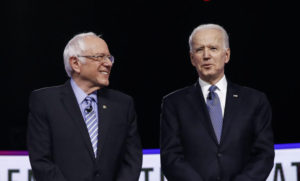
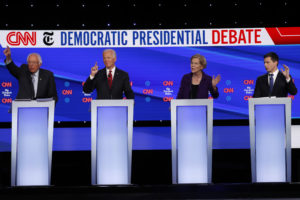

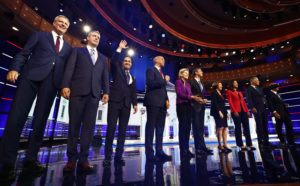
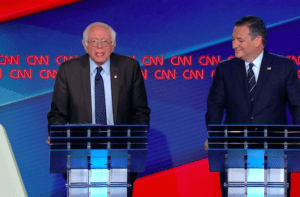
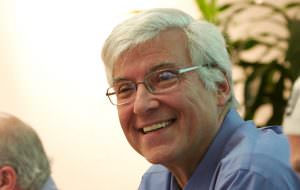
You need to be a supporter to comment.
There are currently no responses to this article.
Be the first to respond.